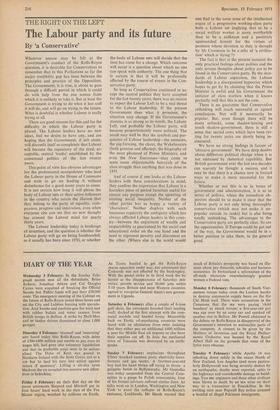THE RIGHT ON THE LEFT
The Labour party and its future
By 'a Conservative'
Whatever unease may be felt at the Government's conduct of the Rolls-Royce question, it is desirable for Conservatives to remember that in this Parliament so far the major credibility gap has been between the principles and practice of the Opposition. The Government, it. is true, is about to pass through a difficult period in which it could do with help from the one source from which it is unlikely to lake it. But at least the Government is trying to do what it has said it will do, and will go on trying in the future. What is doubtful is whether Labour is really trying at all.
There are good reasons for this and for the difficulty in which the Labour party is placed. The Labour leaders have no new ideas, feel no desire to have any, and are hoping that the Government, if left alone, will discredit itself so completely that Labour will become the repository of the tired, ac- ceptable, central 'truths' established by the consensual politics of the last twenty years.
This point of view has obvious advantages for the professional manipulators who lead the Labour party in the House of Commons and wish to go on leading it without disturbance for a good many years to come. It is not certain how long it will please the body of Labour MPS or their active followers in the country who retain the illusion that they belong to the party of equality, com- passion, progress and innovation, even when everyone else can see that no new thought has crossed the Labour mind for nearly thirty years.
The Labour leadership today is bankrupt of invention, and the question is whether the Labour party will go on being bamboozled; as it usually has been since 1950, or whether
the body of Labour MPS will decide that the time has come for a change. Which outcome will occur is a question about which no one can speak with authority. The one thing that is certain is that it will be profoundly affected by the course of events in The Con- servative party.
So long as Conservatives continued to ac- cept the central politics they have accepted for the last twenty years, there was no reason to expect the Labour Left to be a real threat to the Labour leadership. If the present Government does what it promises, the situation may change. If the Government's stamina is as strong as its words, the Labour Left, and probably the Labour party, will become proportionately more militant. The result may well be that the symbols and per- quisites of Labour leadership—the memoirs, the pig-farming, the claret, the Wykehamists (both genuine and affected), the biography of the most plastered of Prime Ministers, and even the New Statesman—may come to seem more objectionable betrayals of the class struggle than anything that was done in 1931.
And of course if one looks at the Labour leaders with these considerations in mind, they confirm the impression that Labour is a harmless piece of period furniture useful for almost any purpose except the upsetting of existing social inequality. Neither of the other parties has so happy a variety of 'characters'. Neither displays with such luminous regularity the ambiguity which has always afflicted Labour leaders in this coun- try—between the enjoyment of wealth and respectability as guaranteed by the social and educational order on the one hand and the need to represent poverty and discontent on the other. (Where else in the world would one find in the same issue of the intellectual organ of a progressive working-class party
both a Labour MP implying that to be a
social welfare worker is more worthwhile than to be a milkman and a positively squirearchal lament for the virtues of postmen whose devotion to duty is thought by Mr Crossman to be a relic of 'a civilisa- tion' which is 'dying'?) The fact is that at the present moment the only practical feelings about politics and the only serious thoughts about policy are to be found in the Conservative party. By the stan- dards of Labour aspiration, the Labour leadership is a disorganised hypocrisy which hopes to get by by claiming that the Prime Minister is awful and his Government the initiator of class warfare when it knows perfectly well that this is not the case.
There is no guarantee that Conservative rethinking will reach successful or agreed
conclusions. Nor will it necessarily be
popular. But, even though there will be many setbacks, some shadow-boxing and much shadow-government, there is still a sense that sacred cows which have been rot-. ting for twenty years are slowly being in- cinerated.
We have no strong feelings in favour of 'abrasive government'. We have deep doubts about deliberate political change when it is not sustained by rhetorical capability. But British government over the last two decades can scarcely be thought a success, and it may be that there is a chance now in limited ways to make it more successful for the future.
Whether or not this is so in terms of government and administration, it is so in terms of politics, where the immediate ob- jectives should be to make it clear that the Labour party is not only being thoroughly conservative (which may not make it un- popular outside its ranks) but is also being totally unthinking. The advantages to the Conservative party are perfectly clear. So are the opportunities. If Europe could be got out of the way, the Government would be in a better position to take them, to the general good.


































 Previous page
Previous page